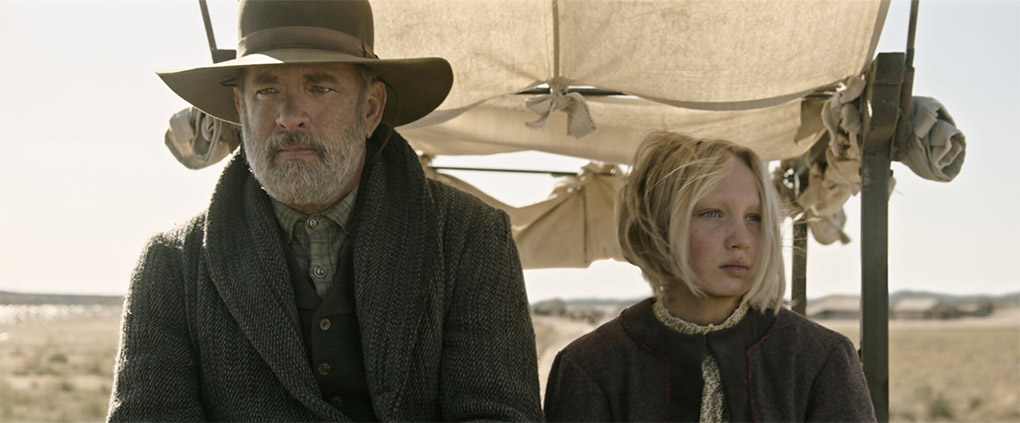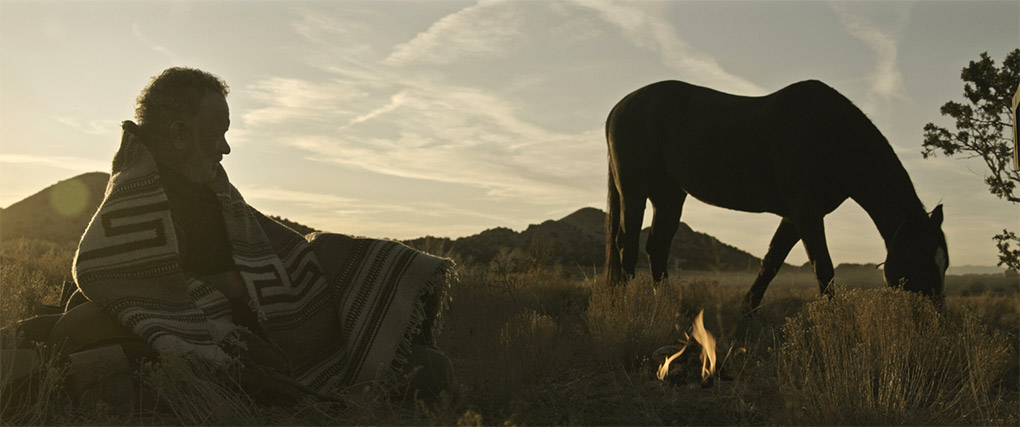| |
‘“It’s a story of reconstruction and how, at the time of division, these two characters go on a journey. And their journey is towards a place where they can feel they belong,” says Greengrass. “I think it’s a journey we’re all on,” he adds. “I think that’s true of all of us in a way. What are we gonna do in our country? It’s split down the middle, isn’t it? I think that [Brexit] division is somewhat obscured now, by the Covid crisis. But it’s going to emerge as soon as the immediate Covid crisis is over. And we will be in the shadow of tremendous loss and grief, bitterly divided.”’ |
| |
Interview director Paul Greengrass in The Independent* |
I have a habit that I indulge in very infrequently but it’s one that seems to allow me access to the emotional heart of a film more than anything else. If I know and respect the work of the composer of a film directed by a director for whom I feel likewise, I sometimes buy the soundtrack and play it to death before I see the film. I spent a week while working listening on repeat to James Newton Howard’s sublime, and mournfully but defiantly ‘western’ score of News of the World. To my discredit, I didn’t get to see the film until weeks later because of personal bias and context. The score said things about the images that I felt, in my ignorance, I just wasn’t in the mood for. One of my favourite all-time Newton Howard cues simply does not accompany visuals that do the score anything like justice. All I had to go on was a grizzled Tom Hanks and a young girl sitting next to him on the poster. I knew enough about Hank’s work and choices to know this would be a worthy work but of all other aspects of the film, I was oblivious.
Until last night.
Wow. This is mythic storytelling on a grand and yet intimate scale (clichéd film reviewing brought to you by Alan Smithee Jnr.) but it’s genuinely how I feel. I said to my wife this morning about the startling imagery we both adored, “I could have broken pieces off some of those images and happily eaten them.” With Greengrass’ eye and Newton Howard’s ear, we have about the best modern pairing mainstream cinema can offer. I’m just gutted I could not see this superlative film on a bigger canvas. Let’s not forget the filmmaker’s less than secret weapon, an actor who can hold the screen with a presence that is simply true. Tom Hanks is probably everyone’s idea of a clean cut American mainstream star actor but his choices are sometimes so left field, that his credibility, over may genres, goes through the roof. I still maintain Cloud Atlas will (eventually) become a modern classic. Yes, he’s known for his straight roles (as in narrow range not heterosexual) but when he wanders into more dangerous territory, his innate instinct makes every look, every gesture, and movement so real. I can offer no higher praise. You may hate a movie he stars in but you can oh-so rely on Hanks to deliver. A friend of mine cut an episode of Spielberg’s mega-series Band of Brothers directed by Hanks and he had nothing but praise and respect for the man’s work and work ethic. The role of Captain Kyle Kidd would not stretch the actor by any means but that’s not the point. He inhabits Kidd so completely, you sometimes find yourself asking the screen “Why does Captain Kidd look a little like that actor, whassisname?” This is what immersive really means.

UK readers may have a very uncomfortable response to the words ‘News of the World’, a Sunday tabloid for which the words ‘gutter press’ were invented, almost bespoke tailored in fact. This miserable, lowest common denominator rag earned its demise by its journalists being found guilty of illegal phone tapping, the worst of which caused a grieving family to believe their dead daughter might still be alive. The newspaper’s suicide was a cheap way of drawing a faint veil over crimes whose effects still reverberate today. And yet, there is a connection to the paper’s movie namesake. Media baron and the ex-newspaper’s owner Rupert Murdoch, used to own 20th Century Fox. The film’s development started as a Fox 2000 picture. Disney gulped Fox down without pausing for breath and the project moved to Universal Pictures, one of the few independent majors still resisting the decaying orbit of the black hole that is the House of Mouse. It’s such a lovely surprise that films like News of the World can get made and such a shame Covid cut it off at the knees theatrically (but streaming has its own success stories, ones I’ve yet to figure out). Trying to find out how films make money streaming is like trying to change the language setting in Microsoft Word.
It’s the mid-west in the United States in the year 1870, and after a bitter civil war lasting four years (coincidentally the length of a President’s term…), Captain Jefferson Kyle Kidd is on his way home to his wife, making a living reading the news from further afield to curious townsfolk charging 10 cents a head. On his journey, he finds an overturned cart, a recently freed slave hanging from a nearby tree and a young girl dressed in what appears to be Native American clothing, specifically those of the Kiowa tribe, one I was not acquainted with given my American history has emanated largely from Hollywood. After an encounter with a patrol, Kidd is charged to take the girl to a checkpoint where he learns that he can either wait three months for the representative of Indian Affairs to escort her back to the only family she is blood-connected with (German settlers, in Texas 400 miles away) or he can take her himself. After a stop-over with a friend and sympathetic inn keeper, Kidd discovers - via his friend’s language skills - that ‘Johanna’ (Kiowan name ‘Cicada’) is more connected to her Kiowan family. Kidd decides to take her to her surviving family, an aunt and uncle, despite the language difficulties between them. Just before they set off, a group of ex-Confederate soldiers offer to buy Johanna (I was a little stumped on why she was so valuable and on second thoughts, perhaps that’s a road on which I do not want to travel). In the novel, it was explicit (to get a high price selling her into prostitution). Kidd and Johanna set off in the dark to try and lose these men but they doggedly follow…
That’s really just the start of the story. What keeps you glued is the extraordinary performances of the two leads. I mentioned Hanks’ unerring talent as a performer. But what about Helena Zengal as Johanna? Stunning, just absolutely stunning. We must always acknowledge director Greengrass’ role in shaping her performance. But what a performance. She’s wild, cunning, desperate and cornered. She initially considers Kidd as her second kidnapper but of course the relationship deepens as constant threats of death often bring people together, not that I would know of course. The closest I get to death threats is leaving the butter dish open. There is a smile in the film that is so well earned, it floors you emotionally particularly as that face has been struggling just to survive for so long. Ms. Zengal is a true talent and I hope that childlike instinct for truth on screen never leaves her. Each performance, however small, shines in its own way, even those characters with malevolence on their minds. Kidd’s intimacy (implied on screen) with friend Ella (Elizabeth Marvel) is subtle but affecting and you do ask yourself the question “Has Kidd has just been unfaithful to his wife?” This is answered quite satisfactorily toward the end. Again, Marvel was a familiar face that while watching her short scenes I couldn’t quite place her… She was, of course, the female President in Homeland and appeared in a recurring role in House of Cards until its lead Kevin Spacey was shown the #metoo door. The nastier characters in the film are all horribly believable and in one scene Kidd, at no small risk to himself and his charge, refuses to read the ‘news’ given to him by a local tyrant and instead fans the flames of uprising reading true stories and not vanity rags. Despite himself, Kidd rights wrongs as he sees them as he travels from town to town.

Cut with real sensitivity towards the immaculate performances, editor William Goldenberg was working against the tide and fashion of micro-cutting (something Greengrass utilized when appropriate in his three Jason Bourne films). But it must have occurred to both director and editor that this was a classic tale in a classic genre that needed care and very little razzmatazz. Each cut is measured, the timing perfect to propel the story forward but giving us time to allow the central relationship to grow. As I mentioned, some of cinematographer Dariusz Wolski’s compositions and lighting are edible. Given that the iconography and tropes of the western are so ingrained even in those who’ve never seen The Searchers, and the limitations of the colour palette of light brown, all the way to dark brown, it seems he’s worked a small miracle. The visual nod to Ford’s classic is also very nicely delivered. News of the World felt so fresh, vivid and real. On hand, quietly enhancing the emotional experience of each scene, is the great James Newton Howard, the man at the very top of the Hollywood composer tree for my money. His work is rooted in all too familiar western orchestration – and for this reason I didn’t fall for it straight away. But over time, this wonderful score hijacks your emotional switchboard and at certain, perfectly timed moments, flicks the switches. There is a smoothness to the score that is beguiling enough. If I had a qualm it would be that I could have heard the music (in a superb surround mix no doubt) just that ten per cent louder. But perhaps that’s only because I knew the score so well. Music and images like these just work so well. There is a stand out moment when Johanna has run away and she glimpses in the lightning flashes her Kiowa tribe relocating on the other side of a river during a rainstorm at night. She is desperate to join them but through the fierce weather, her cries cannot be heard. The music softly yearns with her, doubling up the power of the scene. Captain Kidd’s main theme is very simple but very touching. Film score aficionados will notice small snippets, tiny three note quotes from Maurice Jarre’s work on Dead Poet’s Society and a tune that echoes Leonard Cohen’s sublime Hallelujah. I can’t say if these were intentional but that’s the trade off with having so many scores in one’s head.
If nothing else, News of the World is a truly affecting Western made by a handful of talented people whose skills interlink, dovetailing exquisitely to make a whole that is as emotionally honest as films get. If you are into storytelling and find superheroes just a little bit tiresome, then here’s a film for you. You may say ‘old fashioned’ but in my book that’s a badge of honour particularly when it’s fashioned so superbly well. Bravo.
|